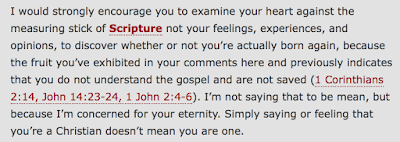There seems to be an incredible amount of drama coming from certain christian circles these days. Not so long ago, a group of church-goers almost broke the internet over
the 'scandal' of a woman breast-feeding in church.
Now a new catastrophe has been unleashed, with the publication of an open letter from a graduate of
Bethel's School of Supernatural Ministry. This graduate has had the temerity to
challenge the church over its behaviour and attitude towards LGBT christians in its midst. It would appear that some people can't deal with the outrage of the words of their
idols celebrity pastors being questioned. Touch not God's anointed and all that...
I noticed that one Bethel "pastor" posted this in response (making me wonder if he actually read the original letter):
Although one of his followers described it as "bold, clever and uncompromised" I, in fact, don't believe it stands up to much scrutiny.
"I cannot believe the arrogance of 2 Lgbt women who say they are Christian, who just wrote an article against Bethel." [emphasis added]
Disregarding the accusations of arrogance... isn't implying you believe someone else isn't a "real" christian just a bit... well... arrogant?
Regardless, it seems to me that the real cause of Ben's anger is the fact that someone has dared to challenge Bethel and its leaders - thus touching the sacred cow.
"It's absolutely shameful to even challenge people who love and honor so well." [emphasis added]
Hmmm... if they "love and honor so well" why is this woman saying she feels unloved and dishonoured? "What I see coming from Bethel in this area is not respectful or honoring."
"Who are you to question the God of the universe and His words that have been there from the ages."
Is the issue really about questioning God? Or is it questioning the "man of God" that really gets Ben riled? Because the God I know has never been afraid of being questioned.
"I had a period in my teens where I had a same sex attraction, but God delivered me from it, and I never struggled again."
Simple as that. Magic. And
everyone should be like Ben, because his experience trumps their's!
"And as for bethel, my life was changed there. I had huge issues and was nothing but embraced and I know for a fact you both were too."
Again, Ben's experience trumps that of others. Furthermore, he gets to tell them what their experience actually was (that's called gas-lighting girls and boys...) Perhaps, in his haste to react, Ben missed the parts where the writer speaks positively about Bethel, acknowledging her gratitude for the good things she found there?
"Your just upset cause they wont bend and make your feelings more valuable then Gods standards."
More accusations, and more outrage that the leaders at Bethel should have to consider the feelings of others. I do wonder if he's confusing Bethel's standards, with God's...
"If you don't want to change however, and want to live by emotion, feeling and sensuality..."
As this is exactly the type of judgement the writer was lamenting in her letter "[Kris Vallotton] also said homosexuals are simply people whose character has atrophied to the point where we no longer have the moral fortitude to hold ourselves back from our lusts", I'd say Ben has learned well from his leaders.
"...I won't sit back while my friends get accused"
Maybe it's time we learned the difference between accusation and disagreement. Disagreeing with a brother, even if he's a leader at Bethel, is not a sin.
"Ps: they wrote against Bethel and were praised for standing up!" [emphasis added]
Despite his repeated accusation that the author "wrote against Bethel", it's actually not true. She was simply voicing her concerns about one aspect of Bethel's teaching. And she was praised - very appropriately IMO - for the grace she displayed even in her disagreement with the church. "Bethel is a beautiful place. Thank you for the 6 years of community and equipping. I hope Bethel is able to have a positive impact on people for years to come."
"I will keep this post up for a short time - because it's not my heart to divide, but rather to lay a firm ground for truth."
This looks to me more like a desire to enforce conformity, not present the truth. The not-so-subtle message here is: comply with the dictates of the church or you will be accused of creating division.
But as the letter pointed out, "You told us over and over, both in school and in church, that disagreement was healthy and that we didn’t have to agree to be family. Kris, you talked about God moving us away from denominationalism (where we gather out of agreement) and into apostleship (where we gather because we’re family). And I still believe that’s the direction we’re meant to take."
Now it seems to me that driving all this bluff and bluster from Mr Fitzgerald is a dangerous belief that there are some christians who are beyond being questioned or challenged. Because, irrespective of the issue being debated, this type of reaction from any church leader speaks of a culture suspiciously akin to
Animal Farm. In other words, "All christians are created equal, but some are more equal than others!"
So maybe it's time we stopped treating celebrity pastors like demigods, and realised we are all brothers and sisters here. No-one is infallible. No-one is above questioning. And no-one's word should be taken as gospel.











